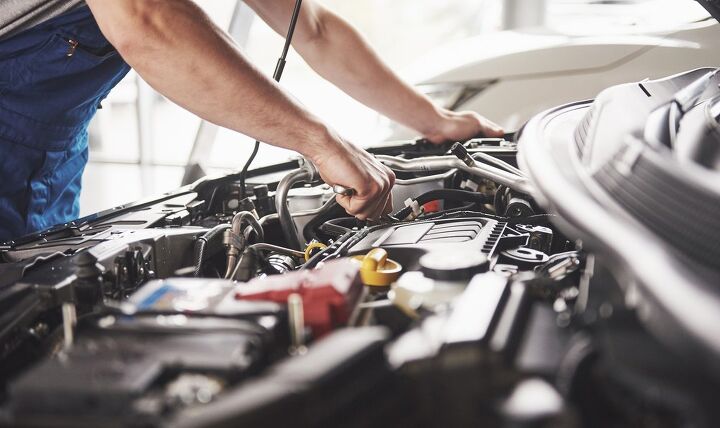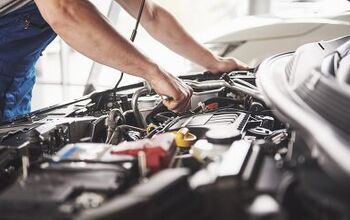NY Right-to-Repair Law Exempts Automakers

Governor Kathy Hochul has signed a right-to-repair bill into law for New York after it lingered within the state legislature for the better part of a year. However, many advocating for legal protections allowing consumers to fix and modify products have started criticizing changes made to the rule on behalf of large business entities hoping to see it neutered. While much of this pertains to the tech lobby representing companies like Apple, Microsoft, Amazon, and Google, sizable exemptions have been similarly carved out for automakers.
Despite right-to-repair having become one of the largest grassroots movements hoping to combat what it sees as predatory and anti-consumer behavior, New York is one of just a handful of states to actually pass any laws relating to the matter. Unfortunately, the “ Digital Fair Repair Act” saw numerous changes before being signed by Hochul.
Originally intended as a way to protect consumers (and smaller shops) from businesses trying to withhold parts, schematics, diagnostic equipment – or maintaining any corporate policies – that might curtail independent repairs, the resulting legislation has been accused of being rendered toothless after these changes. Right-to-repair advocates, like Louis Rossman, have likewise noted that the majority of these alterations took place at the last minute – after Hochul’s office had reportedly met with tech lobbyists.
Alterations to the bill included exempting motor vehicles, home appliances, medical devices, and off-road equipment (e.g. tractors, ATVs). But they’ve been followed by subsequent tweaks that would allow equipment manufacturers to sell “assemblies” of parts, rather than individual components, whenever it believes the resulting work might incur heightened risks.
Since a company can define that risk however it chooses, there’s no threshold for what qualifies. There is likewise no requirement for manufacturers to fork over any security codes needed to repair a device (be it a phone or a vehicle) and what few protections do remain won’t even be applied to any products manufactured before July of this year.
Rossman has asserted that the above changes have made the legislation “functionally useless.”
The bill received an uncharacteristic level of bipartisan support, passing the state assembly 147–2 and the senate 59–4. It was formally delivered to the governor in December, according to the New York Senate's bill tracker. However, she had reportedly been considering it since its summer passage.
In an interview with Ars Technica, Gay Gordon-Byrne, executive director of the Repair Association, noted that the "opposition has not backed off" despite it having been widely supported by the NY legislature in June. Gordon-Byrne alleged that industry groups are pushing to have late amendments favoring tech firms added on all right-to-repair laws, adding that the bills’ sponsors ultimately have to decide whether or not they’ll go along with it.
This certainly seems to be the case with New York’s Digital Fair Repair Act, with Hochul repeating many of the excuses favored by lobbying groups hoping to weaken the legislation. She’s on record as claiming the changes made to the bill are intended to lessen security risks and mitigate risks of physical harm whilst making repairs. Those have been the default lobbyist narrative for several years. But the subsequent recommendations never seek to provide customers with the correct parts, equipment, and information that would make them safer whilst doing maintenance. Instead, industry groups typically suggest their having more stringent controls of the products in question – effectively forcing customers to buy a replacement item or have the manufacturer handle all repairs.
Rossman offered an example of this in his video rebuttal to the changed bill by explaining that companies will still be allowed to serialize components, effectively preventing independent repair shops from using spare parts sourced from anywhere other than the original manufacturer – this includes aftermarket components and spare parts harvested from identical products. Working in tandem with extremely rigid warranty requirements, something else the legislation was originally trying to curtail, these rules effectively give the manufacturer more say over what happens to the product than the person who actually bought it – resulting in higher costs for consumers with no alternative options.
“[A] manufacturer will tell you that when you have a bad $28 chip on your motherboard that what you need to do is replace the $745 motherboard,” he said, using Apple as an example.
This seems to be at odds with statements made by other consumer groups supporting the bill after its signing.
“This landmark law will save New Yorkers money, provide them with more convenient repair options, and cut down on waste. When your device is broken, you should have more options than a high-priced service or the landfill,” stated Marta Tellado, president and CEO of Consumer Reports. “The Digital Fair Repair Act will ensure that New York consumers have the choice to fix their own electronic products or have them fixed by a servicer they choose, including those independent of the manufacturer. We congratulate Governor Hochul for signing this key piece of legislation, which will extend new digital rights to millions of New Yorkers.”
Any consumer protections targeting the automotive industry have been obliterated (ditto for farm equipment), with the Digital Fair Repair Act now focusing primarily on small electronic devices. But even that seems to be more for show than anything else. From my vantage point, the law is setting a bad precedent for subsequent legal proposals and clearly goes against earlier calls from the Federal Trade Commission and the White House wanting to see it passed in its original format.
[Image: Standret/Shutterstock.com]
Become a TTAC insider. Get the latest news, features, TTAC takes, and everything else that gets to the truth about cars first by subscribing to our newsletter.

A staunch consumer advocate tracking industry trends and regulation. Before joining TTAC, Matt spent a decade working for marketing and research firms based in NYC. Clients included several of the world’s largest automakers, global tire brands, and aftermarket part suppliers. Dissatisfied with the corporate world and resentful of having to wear suits everyday, he pivoted to writing about cars. Since then, that man has become an ardent supporter of the right-to-repair movement, been interviewed on the auto industry by national radio broadcasts, driven more rental cars than anyone ever should, participated in amateur rallying events, and received the requisite minimum training as sanctioned by the SCCA. Handy with a wrench, Matt grew up surrounded by Detroit auto workers and managed to get a pizza delivery job before he was legally eligible. He later found himself driving box trucks through Manhattan, guaranteeing future sympathy for actual truckers. He continues to conduct research pertaining to the automotive sector as an independent contractor and has since moved back to his native Michigan, closer to where the cars are born. A contrarian, Matt claims to prefer understeer — stating that front and all-wheel drive vehicles cater best to his driving style.
More by Matt Posky
Latest Car Reviews
Read moreLatest Product Reviews
Read moreRecent Comments
- Lou_BC Well, I'd be impressed if this was in a ZR2. LOL
- Lou_BC This is my shocked face 😲 Hope formatting doesn't fook this up LOL
- Lou_BC Junior? Would that be a Beta Romeo?
- Lou_BC Gotta fix that formatting problem. What a pile of bullsh!t. Are longer posts costing TTAC money? FOOK
- Lou_BC 1.Honda: 6,334,825 vehicles potentially affected2.Ford: 6,152,6143.Kia America: 3,110,4474.Chrysler: 2,732,3985.General Motors: 2,021,0336.Nissan North America: 1,804,4437.Mercedes-Benz USA: 478,1738.Volkswagen Group of America: 453,7639.BMW of North America: 340,24910.Daimler Trucks North America: 261,959


































Comments
Join the conversation
"Alterations to the bill included exempting motor vehicles, home appliances, medical devices, and off-road equipment (e.g. tractors, ATVs)."
Oh look, the only things we were trying to get help on.
Will the last person leaving New York please turn out the lights? I think she'll prove to be even shadier than Cuomo.